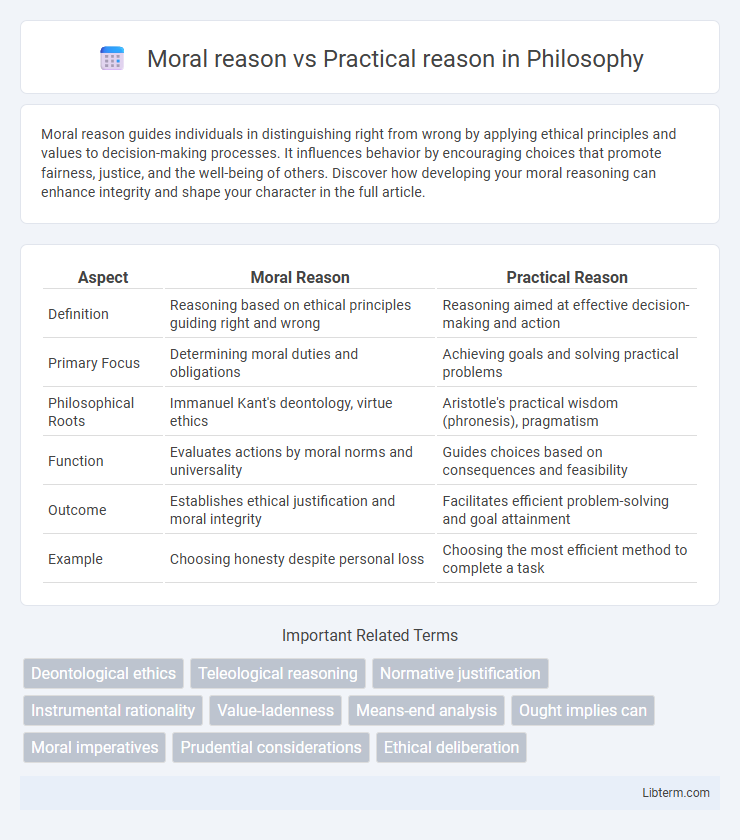Moral reason guides individuals in distinguishing right from wrong by applying ethical principles and values to decision-making processes. It influences behavior by encouraging choices that promote fairness, justice, and the well-being of others. Discover how developing your moral reasoning can enhance integrity and shape your character in the full article.
Table of Comparison
| Aspect | Moral Reason | Practical Reason |
|---|---|---|
| Definition | Reasoning based on ethical principles guiding right and wrong | Reasoning aimed at effective decision-making and action |
| Primary Focus | Determining moral duties and obligations | Achieving goals and solving practical problems |
| Philosophical Roots | Immanuel Kant's deontology, virtue ethics | Aristotle's practical wisdom (phronesis), pragmatism |
| Function | Evaluates actions by moral norms and universality | Guides choices based on consequences and feasibility |
| Outcome | Establishes ethical justification and moral integrity | Facilitates efficient problem-solving and goal attainment |
| Example | Choosing honesty despite personal loss | Choosing the most efficient method to complete a task |
Introduction to Moral Reason and Practical Reason
Moral reason involves evaluating actions based on ethical principles and the concepts of right and wrong, guiding decisions by duties and values such as justice and fairness. Practical reason focuses on selecting means to achieve specific goals or outcomes, emphasizing efficiency, feasibility, and consequences in decision-making. Both forms of reasoning interplay in human cognition, where moral reason establishes normative frameworks and practical reason directs the implementation of those norms through concrete actions.
Defining Moral Reason: Foundations and Principles
Moral reason is grounded in ethical principles that guide judgments about right and wrong, emphasizing duties, rights, and the inherent value of actions beyond personal gain. It relies on normative theories such as deontology and virtue ethics, which prioritize moral obligations and character traits in decision-making. These foundations establish moral reason as distinct from practical reason by focusing on universally applicable standards rather than subjective preferences or outcomes.
Understanding Practical Reason: Scope and Application
Practical reason involves the process of deciding how to act based on goals, desires, and available means, emphasizing effective action in specific contexts. Its scope extends beyond moral considerations to include everyday decision-making, such as planning, problem-solving, and adapting to circumstances. Understanding practical reason requires analyzing how individuals prioritize and balance competing interests to achieve desired outcomes in real-world situations.
Key Differences Between Moral and Practical Reason
Moral reason involves evaluating actions based on principles of right and wrong, often guided by ethical norms and a sense of duty, while practical reason centers on determining the most effective means to achieve specific goals or outcomes. Moral reasoning assesses motives and intentions with a focus on universal values like justice and fairness, whereas practical reasoning emphasizes efficiency, feasibility, and instrumental reasoning in decision-making processes. The key difference lies in moral reason prioritizing ethical obligations and the common good, whereas practical reason prioritizes goal-oriented problem-solving and pragmatic considerations.
Historical Perspectives on Moral vs Practical Reason
Historical perspectives on moral reason trace back to the works of Immanuel Kant, who emphasized duty and universal moral laws as the foundation for ethical behavior, contrasting with practical reason, which focuses on the calculation of means to achieve specific ends. Aristotle's Nicomachean Ethics distinguished moral virtue as a habit aligned with reason while practical reason guides decision-making in everyday life, highlighting a blend of ethical principles and pragmatic considerations. Throughout history, moral reason has often been linked with objective ethical norms, whereas practical reason serves as a tool for navigating particular circumstances and maximizing desired outcomes.
The Role of Emotion in Moral and Practical Reasoning
Emotions profoundly influence moral reasoning by providing intuitive judgments that guide ethical decisions, often serving as moral intuitions that prioritize fairness, empathy, and justice. In practical reasoning, emotions help assess personal goals and immediate consequences, motivating actions aligned with self-interest and survival. Neurocognitive studies reveal distinct but overlapping emotional circuits involved in both moral and practical reasoning, underscoring emotion's essential role in decision-making processes across ethical and pragmatic contexts.
Philosophical Debates: Kant, Aristotle, and Beyond
Kant's moral reason emphasizes duty and universal maxims grounded in categorical imperatives, contrasting with Aristotle's practical reason, which centers on achieving eudaimonia through virtuous habits and contextual judgment. Philosophical debates explore how moral reason prescribes absolute ethical principles, while practical reason navigates contingent, goal-oriented decision-making in human life. Contemporary discourse bridges these views, assessing the interplay between normative ethics and pragmatic considerations in moral agency.
Everyday Examples of Moral and Practical Reason
Moral reason guides decisions based on ethical principles, such as choosing to return a lost wallet to its owner despite personal inconvenience, reflecting honesty and integrity. Practical reason involves making choices aimed at achieving specific goals efficiently, like selecting the quickest route to work to save time. Everyday scenarios highlight moral reason when prioritizing fairness in sharing resources, whereas practical reason is evident in planning meals to fit nutritional needs and budget constraints.
Conflicts and Resolutions Between Moral and Practical Considerations
Conflicts between moral and practical reason often arise when ethical principles demand actions that seem impractical or costly in real-world scenarios. Resolutions to these conflicts involve balancing moral imperatives with pragmatic constraints through frameworks like ethical pragmatism or principled negotiation. Philosophers such as Immanuel Kant emphasize duty and moral law, while practical reason prioritizes outcomes, necessitating reconciliation strategies to harmonize ethical integrity with feasibility.
Implications for Ethics and Decision-Making
Moral reason emphasizes adherence to ethical principles and duties, guiding decisions based on what is right or just, while practical reason focuses on effective means to achieve desired ends and solve problems. The interplay between moral reason and practical reason shapes ethical decision-making by balancing ideal values with real-world constraints, influencing both personal integrity and organizational policies. Recognizing this distinction helps clarify conflicts between moral obligations and pragmatic considerations, fostering more coherent and responsible choices in complex ethical dilemmas.
Moral reason Infographic

 libterm.com
libterm.com